- Home
- Upton Sinclair
Dragon Harvest Page 12
Dragon Harvest Read online
Page 12
That was the way the world was run, and it wasn’t Lanny’s job to find fault with it. Lanny would tell his father all he knew about the British, French, and German leaders, and in return would have the right to ask questions about matters of importance to him. He would pretend that he was interested in the value of stocks, or that he was thinking of some man as a possible client, or just that he was curious about some item of gossip. That was part of the pleasure of living in the great world: one heard so many entertaining stories. Thus Lanny told his father about a one-time Senator from Maryland who went sailing around the world in a yacht every winter, and who wanted to come up to Newcastle to discuss putting money into Budd-Erling. Robbie said: “Send him along. I can always use more.” Lanny didn’t mention the marriageable daughter, not wanting to have his father questioning him on that subject.
II
Lanny Budd’s life had settled into more or less of a routine. He stayed a while on the Riviera and then in Paris; he went to Germany, and then to England. In each place he put on the proper clothes and made himself interesting to the wealthy and powerful, told them what they wanted to know, and used his tact to steer the conversation where he wanted it to go. After each effort he would make out a report—unless it was in Germany, where he never put anything on paper. There were some things he wouldn’t write anywhere, and when he had enough of these he would take a trip to the land of his fathers, make sure that the Big Boss had duly received the reports, hear his comments and questions, and take on board a fresh load of courage and determination.
Every now and then Lanny would fall to wondering: how long would he be able to keep up this routine? He knew the old saying, the pitcher that goes too often to the well is broken at last. How long could he expect to continue this double life, and what would be the obstacle over which he would trip? Perhaps if he knew about it in advance, he might be able to sidestep it. He had raised that question with the young astrologer in Munich who had told him that he was going to die in Hongkong. Lanny had asked: “What if I refuse to go to Hongkong?” and the answer had been: “If you would refuse to go, it would not be written in the stars that you would die there.”
What did Lanny seek to learn in Berlin? First of all, when was Hitler going to strike again, and in what direction? That was the number one question for the whole world just now. Lanny had told F.D. that either Prague or the Polish Corridor would be taken this spring. He wasn’t “rooting” for these things to happen, but naturally he couldn’t help feeling a certain amount of satisfaction whenever his prophecies were verified. Just as Robbie Budd exulted when he had turned out the deadliest killer-plane in the world, so when several million people lost their liberties, Robbie Budd’s son would say: “Well, Governor, you remember what I told you on my last visit?”
Now, driving through northeastern France and Belgium where so large a part of Europe’s industries are crowded, this active-minded conspirator was thinking: “What am I going to ask Göring?” and then: “What am I going to say if he has heard about any of my Red friends?” He would think about Schacht and Krupp von Bohlen and Charles de Wendel and others he was likely to meet and what he wanted to learn from them. He would think about Hess, and of some new psychic adventures to tell him, Rudolf being one who lived according to the advice of the spirits and the astrologers. Above all, Lanny thought about that strangest of human creatures, half-genius, half-madman, whose career he had been following for some seventeen years, and the end was surely not yet: the Gefreiter, or sub-corporal, whose father’s name had been Schicklgruber, and whose sufferings and humiliations as a child and youth the whole human race was paying for with blood and tears.
III
The Hotel Adlon stands at the corner of Wilhelmstrasse and Unter den Linden, which is right in the heart of Berlin, near the statues and monuments and huge cold gray public buildings. It is not a large hotel, according to American standards; only six stories, but solid and dignified, and inside very elegant. It was the place where all Americans went if they could afford leisure-class prices; they spoke of its bar and lounge as “the Club,” and if you stayed there long enough you would meet “everybody,” just as you would at the Crillon in Paris or the Savoy in dear old London. Diplomats, big businessmen, newspaper correspondents with unlimited expense accounts, and pleasure-seekers in the upper brackets—all found the comforts of home here. In the rear was a garden, very pleasant in summertime; in the winter American temperatures were maintained indoors, and only the English complained.
The president of Budd-Erling and his son had been long and favorably known here, and when they telegraphed for a suite they got it. Marshal Göring’s six-wheeled baby-blue and chromium limousine had been seen to stop at the door and take them away; that placed them among the Olympians, and even the haughty SS officers in the hotel lobby bowed to them. Likewise the help beamed upon them, knowing that all services would be generously rewarded. The hotel management would tip off the newspapers and there would be reporters waiting, ready to ask about the errands which had brought them to Germany. This was convenient, letting their friends know that they were in town. For Lanny it was an especial convenience, because it might bring him a note from Bernhardt Monck.
Luxury you could purchase in this “palace hotel,” but privacy and security you could not have at any price. This was not the hotel’s fault; such privileges were beyond the reach of anyone in Naziland. Arriving late at night, and tired after a long drive, the tail end of it in a snowstorm, Lanny turned back the fine linen coverlet and the soft warm blankets of his bed, and there he saw a scrap of paper; he picked it up and read: “Achtung. Abhörapparate im Zimmer!” Your room is wired! Without a word he handed it to his father, who read it, and exchanged a significant look but no sound, for both were aware that the new apparatus which the Gestapo had at its service made the faintest whisper audible.
The meaning of this message required little guessing. Der Dicke knew that they were coming, and where they always stopped; it might be of importance to him to know what they wanted and what their attitude was going to be. The hotel people would have no choice but to co-operate, and inform the authorities when the Americans were to arrive and what rooms were being held for them. The servants, of course, know everything that goes on in one of these de luxe establishments; gossip spreads like wildfire, and everyone would learn that Gestapo agents had come and wired the suite, and perhaps were in the next suite listening. Among the help would be old-timers, Reds and Pinks who had had to take a Brown protective coloration. Anything the Gestapo wanted would be hateful to these persons, and it would be an act of sabotage to tip off two American visitors, who might double their Trinkgeld to the whole staff as an expression of their gratitude.
Lanny held the scrap of paper over the toilet and lighted it; when the ashes dropped he sent them down into the well-arranged sewer system of the Reichshauptstadt. Neither he nor his father took the risk of hunting for a tiny vibrating disk, or wires which might have been run up inside the leg of an iron bedstead. They would follow with redoubled care the rule which a munitions salesman had taught his son in boyhood: never to say any but complimentary things concerning the country of which you were a guest. Confine your plain speaking to a time when you were driving in a car—and had taken the precaution to look into the trunk before you set out.
So now Lanny said: “Did you notice on this trip how many of the factory chimneys in France and Belgium were dead; but in Germany we didn’t see a single chimney that wasn’t smoking?” He allowed himself a grin—since dictaphones have not yet been provided with television attachments.
His father replied in kind. “They are a marvelous people, the Germans. I only wish there was some way we could learn from them.”
And Lanny again: “I wonder if Hermann will invite us to Karinhall this time. That lovely little girl must be learning to walk by now!” They knew from previous experience that there was no goo on this subject that Der Dicke and his beloved Emmy wouldn’t swallow.
IV
The first thing Robbie wanted was a conference with the two men who for a considerable time had been representing Budd-Erling in Germany, on the arrangement of sharing patents and techniques with Göring. Robbie wouldn’t talk with these men in his hotel or in theirs; he wanted Lanny to take them in the car, the only really safe place. The car was heated, provided that the engine was running. Lanny would have to drive—wherever he chose to go.
He was there to oblige, and he said “O.K.” Robbie settled himself in the back seat, with one of the men on each side of him. Lanny took them out toward Potsdam and beyond, past snow-covered fields; presently, in one of them, he saw great tanks maneuvering, for all the world like a herd of elephants rushing this way and that, scattering the snow in clouds and making a great roaring. But the three men gave hardly a glance; they were absorbed in the study of diagrams and charts. Each of the three had brought a well-stuffed brief case, and their conversation was full of figures, and of technical terms which puzzled even Lanny, who had listened to the details of airplane construction and operation through many a boresome hour. They were concerned for a while about the coffeepot, and then about the alarmclock, and then about the birdcage—none of which objects would have seemed to an outsider to be essential to flying six or seven miles up in the air; but these men found it so, and did not smile while they said it.
The coffeepot had a more formal designation, of course; it was 32-708-4B, but that was hard to say and still harder to remember. It was a heater for the pilot’s cockpit, and was attached to the exhaust. The operator in the sheet metal department who first made it had called it the coffeepot because that was its shape; the name had spread through the plant, and had stuck. The gearbox looked like an alarmclock, and a fitting in the tail assembly looked like a gambling device known as a “birdcage.” In the same way the tubes supporting the seats were flutes, and the electrical conduits piled into boxes were spaghetti. Somewhere in the complex structure were horsecollars and slingshots and hayhooks and violin pegs; butterflies, elbows, stars, fingers, half-moons, and even rabbit ears. All this in Connecticut, of course; to the serious-minded Germans such a development would have been lèse-majesté.
The sun, low in the winter sky, came out from behind the steel-gray clouds, and they stopped for a while to stretch their legs. Down the broad highway came marching a great column of men in gray-green woolen uniforms; a whole battalion, a thousand or more young Prussians in the prime of life, sturdy and grim, loaded down with heavy packs; a route march, doubtless a long one—for they could never tell when the Fatherland might need them, and they must be in condition winter or summer. Coming near to the car, they burst into song: “Today Germany belongs to us, tomorrow the whole world.” It was a defiance, and they meant it, personally and directly, for the Ausländer in a car with French license plates. American boys under such circumstances would have grinned as they passed, but on these faces there was not a smile; most of them looked straight ahead, as if they had been on parade instead of a tedious march. This was the Hitlerjugend, which had been in the Führer’s keeping now for six years. Lanny wanted to say: “Hurry up and improve your planes, Robbie; and don’t give any more secrets to Der Dicke!”
V
Returning to the hotel, Lanny stopped in the lobby, and so ran into an adventure. His path crossed that of a lady, a smallish, birdlike lady who moved quickly and glanced here and there as a bird does when it is picking up whatever it lives on; a lady who might have been thirty, and would have been younger if she had taken off her gold pince-nez. She was rather pretty, and wore a brown plaid coat of English tweed with a mink collar, welcome in the month of February on the flat lands which had once been the marshes of Brandenburg, and were still swept by icy gales from the Baltic and the snow-covered mountains to the north.
The lady’s alert eyes swept over a youngish-looking gentleman wearing a tweed overcoat and a Homburg hat, both from London. The eyes showed no signs of interest, but the gentleman stopped and exclaimed: “Well, well! Isn’t this Miss Creston?”
“It is,” replied the lady, and stopped. “But—” she began.
“Don’t you remember me?” That was very ill-bred indeed, but Lanny had had a rumpus with her the last time they had met, and he chose to tease her.
“You have me at a disadvantage,” replied the lady, with that firmness which was a part of her personality.
“I am the troglodyte,” said the creature.
“Oh! I remember. You are Mr.—Mr.—”
Again Lanny waited, just to be mean. Then he said: “Budd, the art expert who lives in an ivory tower, and doesn’t care anything about politics or humanity or any of those ethical things.”
“I see that I offended you,” replied the lady, drawing herself up to what little height she had. “I am sorry.”
“Don’t spoil it all,” responded the other. “You impressed me greatly. Now I find you—of all places in the world—among the people upon whom you have declared war!” He said it with his best grin, and when he saw that she didn’t know quite how to take it, he was still more pleased. “You are staying at the Adlon?” he inquired.
“No, Mr. Budd; I am a mere writer, and nothing even approaching a plutocrat.”
“But here is the place for local color! Have you an engagement at the moment?” When she admitted that she hadn’t, he suggested: “Shall we sit down and improve our acquaintance? We were in the same room for only an hour, and most of the time we listened to other people.”
He led her to a couple of the heavy leather chairs which were not too close to others; and when they were seated he ventured: “You wanted to see this new world with your own eyes? I won’t ask you whether you are pleased with what you have seen. Some people change their opinions here, while others have them confirmed.”
“I am a person with some fixed principles, Mr. Budd.”
“I gathered that from our discussion in my friend Sophie’s drawing-room; and I was interested in what you said. Since then I have looked for your name in such magazines as I have seen, but I haven’t come upon it.”
“I happen to have a story in the current Bluebook.”
“Thank you for telling me. I’ll get it without fail.”
“I’m not sure if you’ll find it here in Berlin; and perhaps I’d better advise you to forget it. The story is called ‘The Troglodyte.’”
“Oh, how charming!” exclaimed the socially trained creature. “You mean that I have the honor of being in it?”
“We writers have to use the material which comes to us. But naturally, we change things; one character becomes a composite of many.”
“I dare say you have met more than one man who loves beauty and peace, and tries to keep himself aloof from the hatefulness he sees around him. Is the scene of your story the Cap d’Antibes?”
“It is Capri, which I have also visited.”
“But the villa you have described bears some resemblance to that of the Baroness de la Tourette?”
“In some details, possibly.”
“It may amuse you to hear that when my mother was discussing our little passage at arms, she predicted that the room and everything in it would appear in a story. She saw you making mental notes.”
“Explain to your mother, Mr. Budd, that writers have to live.”
“Dr. Samuel Johnson once remarked that he failed to see the necessity.”
“I know: but he went on living and so did the victim of his wit.”
VI
Lanny’s encounter with Laurel Creston had been an unusual one, and every detail of it was still vivid in his mind. She had heard someone remark that Lanny knew Hitler personally; she hated Hitler, and had said so without restraint. Lanny hated Hitler, too, but couldn’t say so, and had to stay hidden behind his camouflage; he was an art expert, an ivory-tower dweller, haughtily aloof from politics. The outspoken lady had called him a troglodyte, which had greatly shocked the polite company; most of them didn’t know what the word meant, but whe
n they learned that it was a cave-dweller, they didn’t think any better of the manners of Miss Creston. Driving home afterwards, Beauty had called her a perfectly odious creature, and her wayward son had let it go at that.
All his life Lanny had been accustomed to the society of women, and now he missed them greatly. He met many, of course, but they had to be ladies of the smart set, whose opinions he despised; he had to lie to them, and that wasn’t his idea of enjoying feminine company. In the old days, with Rosemary and then with Marie, and for a while with Irma, he had been able to say what he thought, and to share interests and pleasures with a woman. He couldn’t see how, as a secret agent, he could ever have that privilege again; but when he came upon a woman who believed what he believed in his secret heart, he was naturally drawn to her, and found pleasure even in a short talk in a hotel lobby. He wouldn’t have dared that on the Riviera, where everybody knew him, and where the encounter in Sophie’s drawing-room had become the subject of gossip. But here it was different; for presumably Miss Creston hadn’t been calling the Führer bad names in the Berlin pension where she was staying!
He was curious about her, and assumed that a writer would be interested in all sorts of people, even troglodytes. He explained that he was here on art business, and didn’t mention his father for fear of provoking a discussion on the ethical aspects of the manufacturing and marketing of killing machinery. He asked if she was traveling alone, and she answered that she traveled with one or more short stories for company; she enjoyed these companions because they always did exactly what she wished them to. Lanny remarked that he had heard of fictional characters who took the bit in their teeth and insisted on having their own way; to which Miss Creston replied that that might happen to a great writer, but she wasn’t anything like that—just an observer of people, curious about their motives and the ways in which they fooled themselves.

 Prince Hagen
Prince Hagen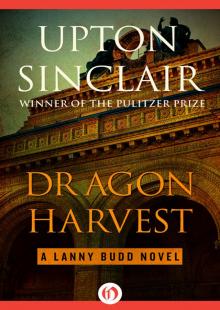 Dragon Harvest
Dragon Harvest The Jungle
The Jungle Sylvia's Marriage
Sylvia's Marriage Oil! A Novel by Upton Sinclair
Oil! A Novel by Upton Sinclair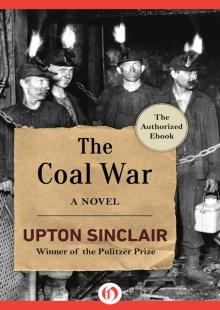 The Coal War: A Novel
The Coal War: A Novel Presidential Agent
Presidential Agent World's End
World's End The Second-Story Man
The Second-Story Man O Shepherd, Speak!
O Shepherd, Speak! Wide Is the Gate
Wide Is the Gate The Return of Lanny Budd
The Return of Lanny Budd One Clear Call I
One Clear Call I 100%: the Story of a Patriot
100%: the Story of a Patriot The Machine
The Machine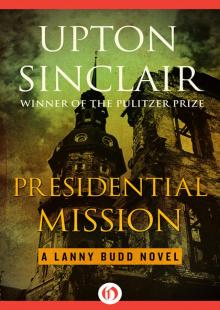 Presidential Mission
Presidential Mission A Cadet's Honor: Mark Mallory's Heroism
A Cadet's Honor: Mark Mallory's Heroism Between Two Worlds
Between Two Worlds World's End (The Lanny Budd Novels)
World's End (The Lanny Budd Novels) Between Two Worlds (The Lanny Budd Novels)
Between Two Worlds (The Lanny Budd Novels)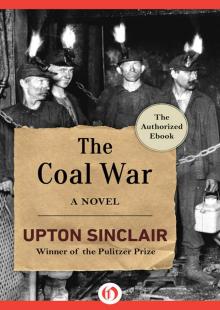 The Coal War
The Coal War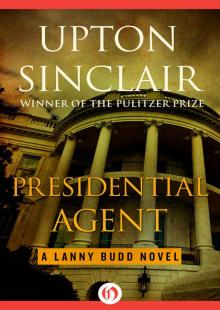 Presidential Agent (The Lanny Budd Novels)
Presidential Agent (The Lanny Budd Novels) Oil (filmed as There Will Be Blood)
Oil (filmed as There Will Be Blood) Wide Is the Gate (The Lanny Budd Novels)
Wide Is the Gate (The Lanny Budd Novels)